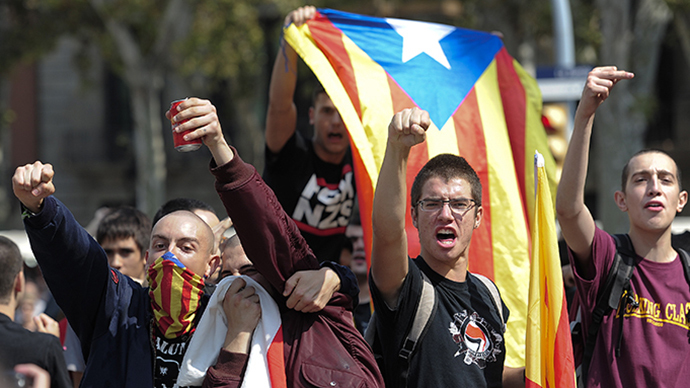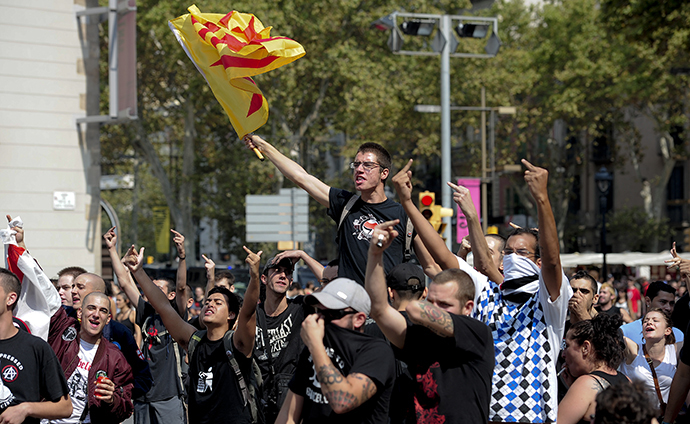'No mock referendum in Catalonia: Why Barcelona looks to Edinburgh?'

The Spanish government has always denied a Catalan entity, but Scotland will pave the way for democracy and the right to self-determination in the region, Anna Arque, Catalan spokesperson for the 'European Partnership for Independence' told RT.
RT:Both Scottish and Catalonian referendums are to take place soon. What can you say about them? What are the main similarities and differences between the Scottish and the Catalonian cases?
Anna Arque: In Catalonia we are not having a mock referendum, we are having a referendum about the independence of Catalonia that has been agreed by the majority of the political parties in the Parliament. So it is a legal, agreed and political binding referendum. The Scottish referendum as well as the Catalonian referendum, doing these referendums is [an illustration of] democracy. So obviously the fact that the Scottish referendum is taking place before ours is great news, and a lot of Catalans will be very happy with a “yes” result. Actually it’s a long time that Catalans are working to have their own referendum.
RT:Why hasn’t Madrid given Catalonia the chance to decide? What kind of reaction do you expect from Madrid when the referendum takes place?

AA: I guess there will be a different position in Madrid once Catalans are voting at a referendum. The Spanish government is still working on the heritage of the regime of 1978. Obviously they are going to just keep denying the reality, but that at the same time that is going to be the Spanish people that will recognize Catalan’s right to vote and to self-determine, [the government] will accept the results. Some of the democrats accepting the results will actually try to arrive at a half-way agreement or will just make things easy for a nice post-independence relationship between Catalonia and Spain. But the Spanish government has always been denying what the Catalan entity is, so we don’t expect much for the moment, also because at the moment it’s all just a prospect. Once we vote, it is going to be a reality and then we will see who the real democrats in the Spanish state are.
RT:Aren’t there any doubts that Catalonia’s economy isn’t strong enough for the region to become independent?
AA: Actually the doubts that are rising are quite opposite. Catalonia, and that has been said not only by Catalans but by the US and European academics, is well-off and it is able to maintain itself. The question that is arising more [often] is whether Spain is going to be able to live without the income, without what Catalonia gives to Spain. But on this side many of us are completely convinced that the Spanish state of course will go on and that the Catalans will do everything possible in order for Spain to keep on a good track, and all of us get a promise of a better future. We won’t have any problem, in case it is necessary, to assist [Spain] in whatever is necessary, because we do not want any fallout from the Spanish state.
RT:The Scots and Catalans are not the only to fight for independence. Why is the independence movement so strong in Europe?
AA: We need to understand that the feeling and the need to be independent by those nations that are at the moment in the states that are not their own states, it has been there for a long time, it is not something that suddenly happens, and it is not a spark that flies in the air. What happens is that the Scottish and the Catalan independence show that this is possible. People may actually see that democracy and the universal right of self-determination is feasible, with the right to be exercised. It is something that each country will have to walk towards. But the point is that we don’t have to see independence as a narrative thing. It’s a good thing, and a good test to prove Europe’s capacity to accept the sign of the times, with democracy that people can vote whether they want or not independence.
The statements, views and opinions expressed in this column are solely those of the author and do not necessarily represent those of RT.
The statements, views and opinions expressed in this column are solely those of the author and do not necessarily represent those of RT.












